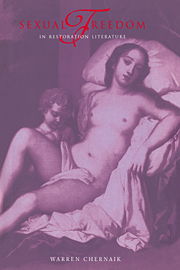Book contents
- Frontmatter
- Contents
- Acknowledgements
- Introduction: the imperfect enjoyment
- 1 Hobbes and the libertines
- 2 The tyranny of desire: sex and politics in Rochester
- 3 Absent from thee
- 4 Playing trick for trick: domestic rebellion and the female libertine
- 5 My masculine part: Aphra Behn and the androgynous imagination
- Conclusion
- Notes
- Index
2 - The tyranny of desire: sex and politics in Rochester
Published online by Cambridge University Press: 04 September 2009
- Frontmatter
- Contents
- Acknowledgements
- Introduction: the imperfect enjoyment
- 1 Hobbes and the libertines
- 2 The tyranny of desire: sex and politics in Rochester
- 3 Absent from thee
- 4 Playing trick for trick: domestic rebellion and the female libertine
- 5 My masculine part: Aphra Behn and the androgynous imagination
- Conclusion
- Notes
- Index
Summary
Any discussion of sexual ideology in the writings of Rochester is hampered by the lack of a reliable biography. Vivian de Sola Pinto's Enthusiast in Wit and Graham Greene's Lord Rochester's Monkey, both nearly fifty years old, are studded with inaccuracies and credulous in their handling of evidence, though Greene's book is worth reading for its psychological insight, with the truth of fiction rather than fact. The two principal biographical sources, essential for an understanding of Rochester's poetry, are his letters, edited by Jeremy Treglown, and Gilbert Burnet's Some Passages of the Life and Death of … John Earl of Rochester (1680). Burnet's book is not a formal biography, but a narration of ‘some passages’, an account of a sinner's repentance explicitly homiletic in intent, with the avowed ‘design’ of ‘doing what I can toward the reforming a loose and lewd Age’. Though Burnet proclaimed his care to speak ‘nothing but Truth’ in reporting his conversations with Rochester during the poet's last illness, modern critics have often been suspicious of the veracity of his account, seeing it as ‘determinedly cosmetic’ (Letters, p. 37), an exemplary fiction. There is no doubt that Burnet makes himself the hero of his own narrative, presenting Rochester's heretical views in order to refute them. Indeed, if the exhausted poet on his sick-bed had to listen to Burnet's interminable lectures on morality and revealed religion (the proportion of Burnet to Rochester in the related conversation, as Greene points out, is over five to one, 1,671 lines as against 302 lines), it may well have made the release of death more welcome.
- Type
- Chapter
- Information
- Sexual Freedom in Restoration Literature , pp. 52 - 79Publisher: Cambridge University PressPrint publication year: 1995



